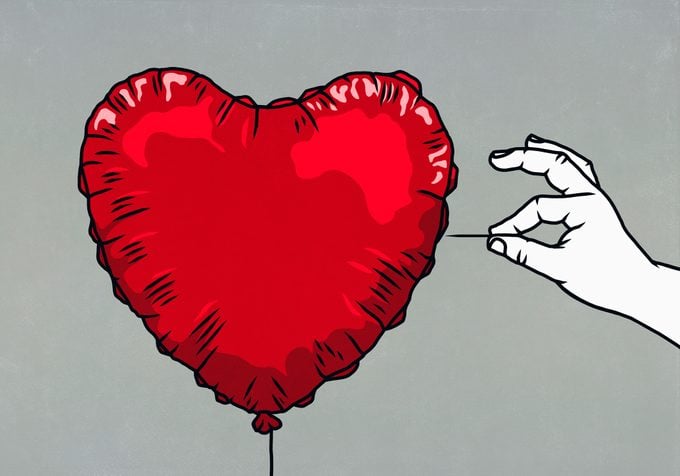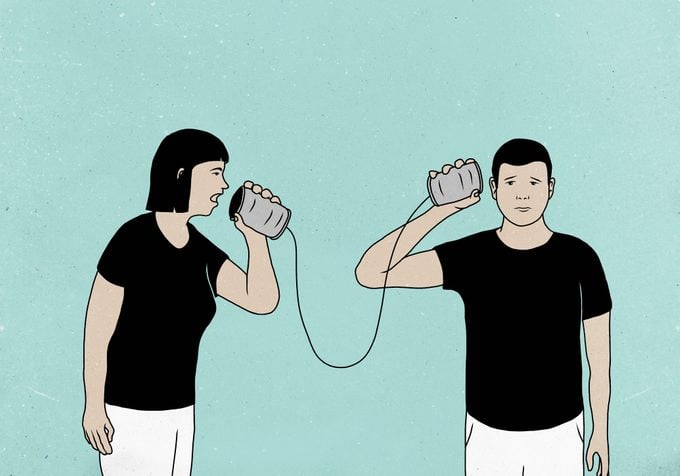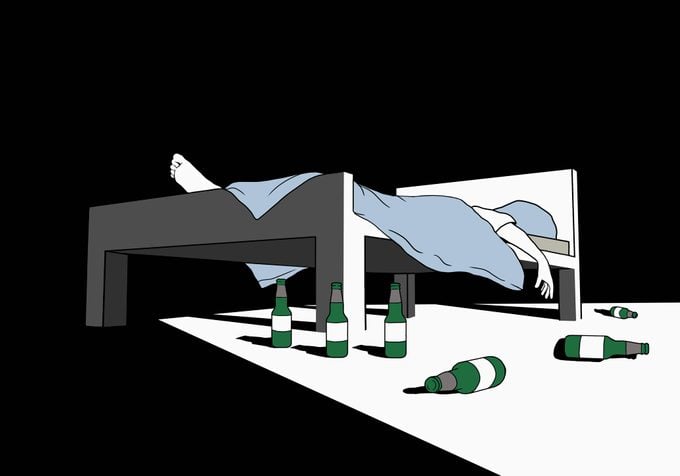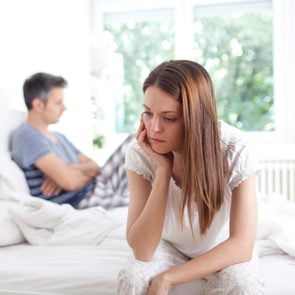12 Signs You’re in a Toxic Relationship
Updated: Feb. 29, 2024
Can you recognize the signs of a toxic relationship? Do you know how to fix the situation? Learn both from our mental health experts.
“I knew relatively early on that my relationship with my then-boyfriend wasn’t healthy,” says Kelsey Turek, 31, of Spring Lake, Michigan. “From the beginning, my boyfriend was very jealous, to the point where he was angry when I went out with girlfriends or even talked to other men.” This became a real problem as Turek worked as a personal trainer and some of her clients were men. She remembers one incident when he saw her in the gym training a male client and threw a fit, eventually storming out in a rage—embarrassing and humiliating her for simply doing her job.
Her boyfriend eventually apologized and said he would try to be better so she let it go, but there were other, more subtle, signs that the relationship was toxic. “He wasn’t interested in my wants or desires, he only wanted to do his hobbies and wouldn’t meet my friends or family,” she explains. It made her feel small and isolated, constantly second-guessing herself. When she tried to talk to him about her feelings, he couldn’t (or wouldn’t) understand, and eventually, it took a toll on her mental health.
Still, she wanted to make the relationship work. “I really loved him. We had created a picture of our future together. He always said he was trying to be better. And honestly, I didn’t believe in myself. I didn’t think I could find someone else, even though I was young and had a lot going for me,” she says.
Get The Healthy @Reader’s Digest newsletter

Recognizing a toxic relationship
Many people have found themselves in what, in hindsight, was a toxic relationship, but it can be hard to recognize a healthy vs. unhealthy relationship when you’re in it, says Nina Vasan, MD, clinical assistant professor of Psychiatry at Stanford School of Medicine, director of the Stanford Lab for Mental Health Innovation, and chief medical officer of Real, an online mental healthcare platform. (And it’s not just romantic relationships, you can also have toxic friendships.) We want to believe that those who love us won’t intentionally hurt us; love gives us the rosiest of rose-colored glasses, she says.
“Often it isn’t obvious when things turn toxic, particularly if you don’t have a lot of experience in relationships, and the instinct is to minimize the issues,” she says. “It’s not uncommon for the non-toxic partner to justify the toxic behavior by focusing on the good things in the relationship or to blame themselves and think they are the ones who need to work harder or change.” Not all toxic people recognize themselves or their behaviors as such.
15 Quotes About Toxic People that Will Help You Heal
Don’t be fooled by the Hollywood hype
Another confusing aspect of unhealthy relationships is that they’re often portrayed in popular culture as being exciting, passionate, and ultra-romantic, says Suzie Pileggi Pawelski, a relationship researcher and coauthor of Happy Together with her husband James Pawelski, PhD, director of education in the Positive Psychology Center at the University of Pennsylvania. “This can cause people to normalize or even idealize toxic behaviors, like a partner saying ‘I can’t live without you,’ ‘I just can’t control myself around you,’ or obsessively wanting to know where you are at all times,” she explains. “In movies, it’s romantic; in real life, those are major red flags.”
10 Tiny Ways to Make Your Partner Feel Loved
Toxic relationships take many forms
So, what is a toxic relationship? Defining what exactly makes a relationship “toxic” is tricky. “Toxic” isn’t a clinical word, it’s subjective, and there’s a wide range of unhealthy behaviors in relationships, Pileggi Pawelski says. On one end you have people who truly love each other but argue a lot, and on the other end, you have domestic abuse. The extremes are relatively easy to recognize but it’s that murky middle where people get confused.
“Relationships change over time and people are usually on their best behavior at the beginning,” she says. “As you progress some of that naturally wears off. Every relationship will have some problems, it’s not an issue of if you fight, but how.”
13 Signs You’re in a Codependent Relationship
Toxic relationships are hard on your heart and mind
The reasons people stay in unhealthy relationships are complex but it’s important to be able to identify when you’re in a toxic relationship because you can feel the effects emotionally, mentally and physically. Staying in an unhealthy relationship increases your risk of heart disease and your overall risk of death, according to a 2015 study published in The Journals of Gerontology. A separate 2017 German study, published in Crisis, found that people in an unhealthy relationship experienced higher levels of depression, hopelessness and suicidal ideation.
988, the New Mental Health Crisis Hotline: 7 Key Facts for Everyone to Know
“Ultimately, a relationship is toxic if the bad outweighs the good,” Dr. Vasan says. But while that equation is simple to understand, that doesn’t mean it’s easy to see. Here are the signs you’re in a toxic relationship.
Sign: Your partner has no friends—other than you
Relationships are stronger when each partner has friends and interests outside of each other, James says. So if your partner discourages you from going to a girl’s or guys’ night out or will only do activities if you’re there with them, that’s a red flag. “This doesn’t mean that you don’t engage in activities with your partner or invite your spouse out with their friends. It just means you don’t feel obligated to do everything with your partner,” he says. “Interdependence, not dependence, is associated with successful relationships.”
5 Factors Linked to Successful Relationships, According to Science
Sign: Hanging out with this person leaves you feeling tired and sick
Your body can give you important clues about your relationship that your mind may not yet recognize, Dr. Vasan says. This could include things like chronic stomachaches or headaches (a sign of anxiety) or simply a feeling of being unwell or not yourself. “Ask yourself, is your partner bringing out the best in you, or weighing you down? Do you feel energized or drained after being with them?” she says. “If you notice that you’re feeling constantly drained, exhausted, or on edge, that’s a sign something’s not right.” Note, non-toxic couples might experience events in their lives that make any relationship more challenging (and even result in feeling tired or sick), and so some self-reflection or therapy in either case would be useful.
Sign: Your partner criticizes you personally or calls you names
Personal attacks—denigrating someone’s personality, values, or physical appearance—are a hallmark sign you’re in a toxic relationship, Pileggi Pawelski says. “It’s okay to talk about things you’d like to change in the relationship but it should be focused on working together to change behaviors, not belittling or criticizing the person themselves,” she says. “Name-calling is always toxic behavior.”
If You Keep Lying About These 10 Things, Your Relationship Is Doomed
Sign: Your partner is constantly texting you to check-in
Staying in touch by sending silly memes or coordinating the kids’ soccer schedule are positive uses of technology, but toxic partners will employ that same tech to control you, Dr. Vasan says. This could include things like tracking your location constantly on their phone, asking you to text frequently or take pictures to prove where you are or requiring multiple reassurances of devotion throughout the day. “Manipulative and controlling behavior of any kind is toxic,” she says.

Sign: They interrupt you constantly or give you the silent treatment
“If your partner is interrupting you that means they’re not listening to you,” Pileggi Pawelski says. “Listening is such an important part of communication in a healthy relationship.” Interrupting you is also a sign that they don’t respect your thoughts or opinions. On the flip side, ignoring you or giving you the silent treatment is passive-aggressive and conveys the same message of disrespect and disdain and also stops helpful communication, she says.
5 Signs of Passive-Aggressive Behavior
Sign: You’re always apologizing and you’re not sure why
“You make me so angry!” “Stop crying, you’re so needy!” “How could you be so insensitive?” One tactic toxic partners often use is making you feel guilty and responsible for their feelings or they put all the blame on you for problems, Pileggi Pawelski says. You are allowed to have needs and wants without being guilt-tripped or shamed for them, she says. Find out if a relationship coach can help you to better navigate these situations.
Sign: They want you to go on a diet, dye your hair, and get a new job
Your partner should love you for you rather than seeing you as a project or something broken they can fix, James says. It’s okay to acknowledge a partner’s faults but it crosses the line into toxic behavior when they try to force or shame you into changing to be how they want you to be rather than listening to what you want. “In a healthy relationship, both partners work together to improve and are inspired to better themselves,” he says.
This 30-Second Habit Can Improve Your Relationship in Just One Day
Sign: All of your partner’s exes are “crazy”
If your partner has one “crazy” ex, that might not raise a red flag, but if all of their exes are crazy the problem likely isn’t the past partners, Pileggi Pawelski says. “Toxic people will do anything to avoid accepting responsibility for their actions, including attacking and blaming current and past partners,” she says.
10 Science-Backed Facts About Breakups
Sign: Your partner is obsessed with you
This toxic sign often gets confused for love because at the beginning it can feel like real passion. After all, who wouldn’t want to be adored and showered with gifts and attention, Pileggi Pawelski says. Unfortunately, obsessive love is unhealthy and can lead to other toxic behaviors like jealousy, stalking, and abuse, she says. “It’s important for each partner to maintain their own individual interests, activities, hobbies, and friends,” James adds.

Sign: One or both of you has a substance abuse problem
Alcohol or drug addiction has a serious negative impact on a relationship and toxic or abusive behavior often goes hand-in-hand with substance abuse, Dr. Vasan says. If your partner has a substance abuse problem, it’s not up to you to fix them—but you can encourage them to get help. “Remember that ultimately, you cannot change your partner, but you can change yourself, and that may mean leaving the relationship,” she says.
Sign: There’s a lot of lying, even about little things
Lying about big things is certainly toxic but constantly lying about little things can also be a red flag, Susie says. (This is how to tell if someone is lying.) It shows they don’t respect you, it’s a way of “gaslighting” you into doubting your own feelings and experiences, she says. This goes for lies you catch your partner telling but also lies you find yourself telling. “If you find yourself hiding aspects of your relationship from your loved ones or if you feel like you need to lie to protect yourself or others, that’s a red flag that the relationship is toxic or abusive,” she says.
Sign: All of your friends hate your partner
How those closest to you feel about your partner is possibly the most underrated yet most important sign of a toxic relationship, Dr. Vasan says. You should pay close attention to what your loved ones are telling you and what you can or can’t tell them. “The problem is that often it is not obvious to the person in the relationship, toxic behaviors might be subtle and easy to explain as something else,” she says. Your friends and family have an outside perspective and they want you to be happy and safe, Pileggi Pawelski adds.
The Most Important Person in Your Relationship May Not Be Your Partner
Solution: Seek professional help—together
The good news is that many toxic relationships can be healed if both partners can recognize the unhealthy dynamic and are willing to work to change it, Dr. Vasan says. “Both must be ready to work on the relationship and address head-on the issues that are making it toxic, and to do so with compassion and respect for the other person,” she says. “Start by working with a therapist or therapy group; having a neutral third party on board can be helpful to facilitate open communication and reflection.”
Science Debunks 7 of the Biggest Myths About a Good Marriage
Solution: Consider whether the relationship is worth saving
Not all toxic relationships can, or should, be saved. Any type of domestic abuse, whether it’s physical, sexual or emotional, is an automatic relationship ender, Dr. Vasan says. “Even one instance of abuse is one time too many,” she says. “If you find that it is hard to end the relationship, reach out to a loved one or mental health professional for help.”
Ultimately the decision whether or not things are bad enough to leave an unhealthy relationship is entirely up to you. That may sound obvious but many people trapped in toxic relationships forget they have a choice or are more concerned about their partner’s wellbeing than their own, Dr. Vasan says. “Realize that you do have control over your own life and deserve to respect yourself,” she says. “And that may mean ending the relationship.”
For Turek, the decision to leave took nearly six years to make. Even though her boyfriend had demonstrated toxic behaviors from nearly the beginning of their relationship it wasn’t until he showed her that no matter what she did, it would never be enough, that she was ready to let go. “His parents were horribly mean to me and yet he’d always do what they said, even allowing them to intervene in our relationship,” she says. “The final straw was when I asked him to stand up for me. He didn’t. I realized then that I would always come in last place.”
Solution: Practice self-compassion and forgiveness
As you think about your own situation, it’s important to show yourself compassion and forgiveness, Dr. Vasan says. It’s very common for people who have been victimized to feel stupid or angry for not seeing it sooner. “This is not your fault. You are not responsible for someone else’s bad behavior, even when it is directed at you,” she says. “Anyone can end up in a toxic relationship; what’s important is that you have the strength to get out of it. Use it as a learning opportunity to understand more about your own patterns and behaviors, and what to look for and avoid in future relationships.”
Now that she’s been out of that relationship for several years, Turek says it worked out for the best in the end. “He was my first real love and that decision to leave was one of the hardest things I’ve ever done, but I wouldn’t be the woman I am now without those painful lessons,” she says.
For more wellness updates, follow The Healthy on Facebook, Instagram, and Twitter. Keep reading:




